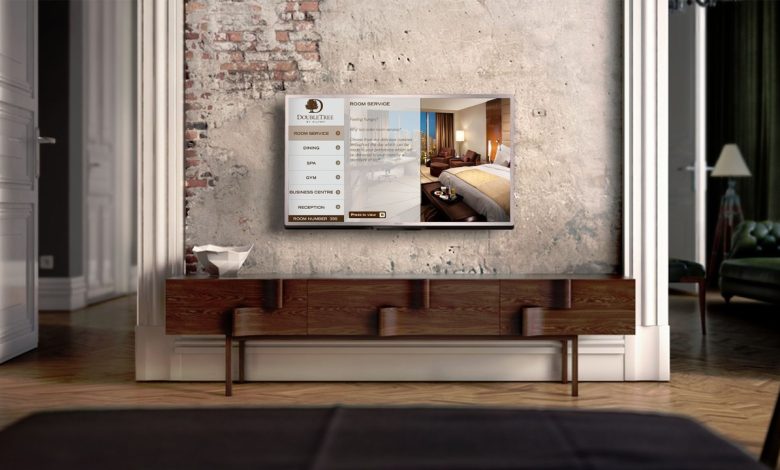Key Features and Characteristics of Hotel TV Systems

While Hotel TV systems are behind the scenes, they are a pivotal part of the guest experience, offering both entertainment and information.
A well-designed TV system can greatly enhance guest satisfaction by providing a variety of services tailored to their needs.
These systems are more than just the hospitality television sets in hotel rooms. They are complex solutions integrating entertainment, communication, and sometimes even operational functions.
Below is an in-depth exploration of the key features and characteristics of modern hotel TV systems.
1. Entertainment and Streaming Options
Modern hotel TV systems have evolved to offer much more than just local or satellite TV channels. One of the most significant trends in hotel TV systems is the integration of streaming services.
Guests now expect access to platforms like Netflix, Hulu, Amazon Prime, and others, often through their own accounts. This self-service model gives them flexibility and access to content they are familiar with.
Many systems now feature hotel casting systems and functionality that allows guests to stream content directly from their devices to the hotel room’s TV.
This is often done through Chromecast, Apple AirPlay, or other casting technologies, enabling guests to watch their favorite shows, movies, or even presentations on a bigger screen.
2. Interactive Capabilities
Interactivity has become a hallmark of modern hotel TV systems. Interactive TV (iTV) allows guests to interact with the television in ways beyond changing channels. With iTV, guests can:
– View hotel services such as room service menus, spa reservations, or local attractions.
– Order room service or book activities directly from their TV screen.
– Access the hotel’s information directory, including maps, facility guides, and restaurant recommendations.
This feature improves the convenience for guests while reducing the workload on front desk staff and concierge services.
3. Customizable Welcome Screens
First impressions matter, and many hotels now utilize customizable welcome screens.
Upon entering the room, guests may be greeted by a personalized message on the TV, addressing them by name and highlighting some of the hotel’s services.
This level of customization enhances the guest experience and makes them feel welcomed.
Some systems can also include information about the weather, flight statuses, or local events on these welcome screens, making the system not only a personal touchpoint but also a practical resource.
4. Multilingual Support
Since hotels cater to international travelers, multilingual support is essential for the TV system interface.
The best systems allow guests to choose their preferred language for both entertainment and system menus, ensuring easy access to content and services for everyone.
5. Video-On-Demand (VOD)
Despite the growing popularity of streaming services, many hotel TV systems still offer Video-On-Demand (VOD), allowing guests to purchase or rent movies directly through the system.
This feature provides immediate access to newly released films or specific genres that might not be available through streaming platforms.
VOD is often supplemented by a library of free content, including documentaries, travel guides, and informational programs.
6. Seamless Integration with Hotel Operations
Another key characteristic of modern hotel TV systems is their ability to integrate with Property Management Systems (PMS). This enables hotels to streamline operations and improve guest services. Through this integration, guests can:
– Check their bill on the TV
– Request housekeeping or maintenance services
– Express check-out directly from their room
Additionally, hotels can use the TV system to upsell services, such as promotions for the hotel restaurant, spa treatments, or local tours, driving additional revenue while enhancing the guest’s stay.
7. In-Room Gaming
While it is less common today with the rise of mobile gaming, some hotels still offer in-room gaming as part of their TV systems.
These are usually casual games that can be played with a remote control or a dedicated gaming controller.
This feature can be a source of entertainment for families with children or for guests looking for a relaxing activity after a long day of travel or business.
8. Energy Efficiency and Green Technology
Many hotels are moving toward more sustainable practices, and this is reflected in their TV systems as well.
Modern hotel TVs often include energy-saving features, such as auto-dimming based on room lighting or sleep timers that turn off the TV after a certain period of inactivity.
Some systems are also designed to integrate with the hotel’s broader energy management system, ensuring that TVs are turned off when rooms are unoccupied.
Conclusion
Hotel TV systems are much more than just televisions; they are sophisticated platforms that play a critical role in the overall guest experience.
From providing entertainment and interactive services to integrating with hotel operations and delivering personalized experiences, modern hotel TV systems cater to the evolving needs of travelers.
For hoteliers, investing in a well-rounded TV system is an opportunity to enhance guest satisfaction, streamline operations, and even boost revenue through targeted service offerings.
As technology continues to advance, these systems will likely become even more integral to the hospitality experience, offering further customization, automation, and entertainment possibilities.





